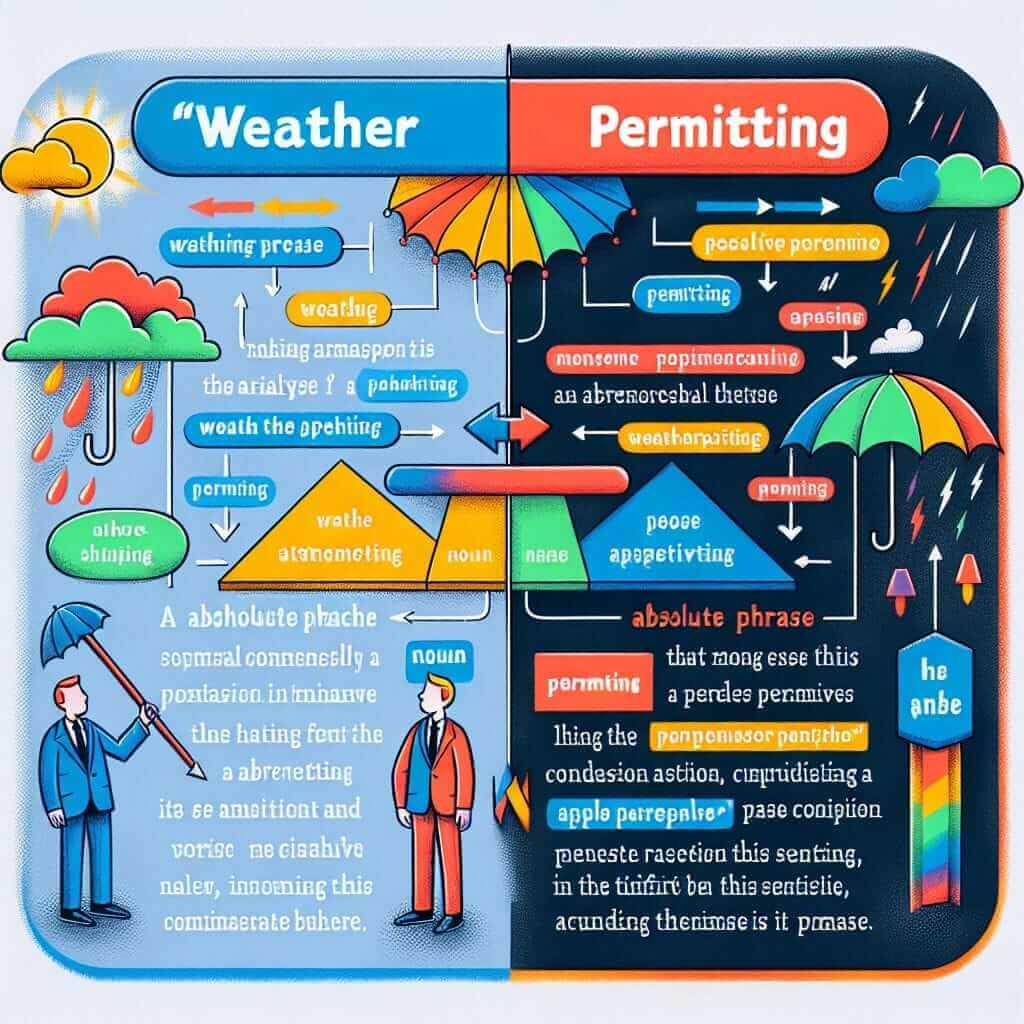Absolute phrases, like “weather permitting,” are sophisticated grammatical structures that can add nuance and variety to your IELTS writing. While they might seem complex at first, understanding their construction and application can significantly enhance your writing score. Let’s explore how to use absolute phrases effectively, particularly in the context of IELTS writing.
Here are a few examples of absolute phrases used in different sections of the IELTS exam:
Speaking:
- “Time permitting, I’d love to travel the world after graduation.” (Here, “time permitting” is an absolute phrase that adds a condition to the speaker’s desire to travel.)
Writing Task 1:
- “While some people believe that technology isolates individuals, others argue that it fosters global connections, their reasoning being based on the ease of communication technology provides.” (In this example, the absolute phrase provides a concise explanation for the second group’s viewpoint.)
Writing Task 2:
- “The government should invest in renewable energy sources. Fossil fuels being a finite resource, it is essential to explore sustainable alternatives.” (The absolute phrase emphasizes the reason behind the writer’s opinion, making the argument more persuasive.)
Understanding Absolute Phrases and Their Significance in IELTS
An absolute phrase is a group of words that modifies a whole sentence rather than a specific word within it. It typically consists of a noun or pronoun followed by a participle (either present or past) and any modifiers related to that noun or pronoun.
For instance, in the phrase “weather permitting,” “weather” is the noun, “permitting” is the present participle, and the entire phrase acts as a condition for a separate independent clause.

Why Use Absolute Phrases in IELTS Writing?
- Conciseness and clarity: They allow you to convey information succinctly, avoiding wordiness.
- Variety and sophistication: They add grammatical complexity, demonstrating a higher level of language proficiency to the examiner.
- Logical flow: They can smoothly connect ideas and sentences, enhancing the coherence and cohesion of your writing.
Applying Absolute Phrases in Different IELTS Writing Sections
1. Writing Task 1: Presenting Arguments and Supporting Evidence
Absolute phrases can effectively present your stance, introduce evidence, or explain a previous statement.
- Example: “Many individuals prioritize career advancement over personal well-being, this decision often stemming from societal pressures and expectations.”
Here, the absolute phrase explains a potential reason for the initial statement, creating a logical flow of ideas.
2. Writing Task 2: Expressing Opinions and Providing Reasons
You can use absolute phrases to justify your opinions or highlight the significance of an issue.
- Example: “Investing in public transportation is crucial for sustainable urban development. Private vehicles being a major source of pollution and congestion, promoting alternatives is essential.”
The absolute phrase strengthens the argument by highlighting a key problem caused by private vehicles.
Mastering Absolute Phrases: Tips for Band 8 and Beyond
- Placement is key: Place the absolute phrase either at the beginning or end of the sentence for clarity and impact.
- Punctuation matters: Use commas to separate the absolute phrase from the main clause, regardless of its position.
- Avoid ambiguity: Ensure the noun or pronoun in the absolute phrase has a clear connection to the main clause to avoid confusion.
- Don’t overuse: While impressive, too many absolute phrases can make your writing sound forced or unnatural.
Common Errors and How to Avoid Them
- Incorrect punctuation: Forgetting commas or using them incorrectly is a common mistake.
- Dangling modifiers: Ensure the absolute phrase clearly relates to the subject of the main clause.
By understanding the structure, purpose, and strategic application of absolute phrases, you can significantly improve the clarity, sophistication, and overall impact of your IELTS writing. Remember to practice incorporating them into your writing to gain confidence and fluency. With consistent effort and attention to detail, achieving a Band 8 in IELTS writing is well within your reach.